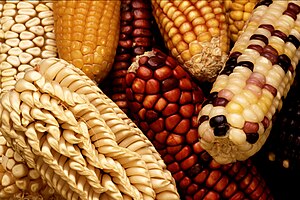Problems with the toxic residue of a mold that attacked the 2012 drought-hit US corn crop may worsen this summer and autumn as Midwest farmers blend off tainted supplies held in storage, grain experts say.
The substance, aflatoxin, is a chronic problem in dry, hot southern states like Texas where stressed crops are vulnerable to the mold. But in 2012, the worst U.S. drought in more than half a century extended the aflatoxin threat moved northward into the heart of the Midwest, resulting in the biggest outbreak since the 1980s.
"As we get into summer, you are going to see the worst of it," said Doug Bartlett, co-owner of Midwest Farm Services, an advisory service in Higginsville, Missouri. "We have tight corn supplies and when we get down to the nitty gritty, there is going to be a lot of the aflatoxin left over, and it will have to be blended off into the new crop," he said.
On April 17, Kansas State University (KSU) announced the addition of Charles Stark to the College of Agriculture as he joins the Department of Grain Science and Industry and the Department of Animal Sciences and Industry.
Stark will serve as the Jim and Carol Brown associate professor in feed technology and manufacturing and faculty coordinator of the O.H. Kruse Feed Technology Innovation Center.
A native of Hastings, Nebraska, USA, Stark was raised on a small dairy farm, but made his way to Kansas when he attended Kansas State where he earned his bachelor’s degree in animal science and his master’s and doctorate’s degrees in grain science.
In this new position, Stark says he is most excited to be able to give back to the feed industry. “I believe the feed science program is at a crossroads in history with this unique faculty position,” Stark said.
“The opening of the O.H. Kruse Feed Technology Innovation Center will allow the faculty and staff to build upon the rich history of both departments, while creating new and exciting programs that will provide global leadership and help feed 9 billion people by 2050.”
President Vladimir Putin held talks with Egyptian President Mohamed Morsi on Friday, April 19, 2013, to discuss the resolution of crises in the Middle East, Russian grain supplies to Egypt, and the development of tourism.
"The main topic was Russian-Egyptian relations," presidential spokesperson Dmitry Peskov said, adding that other topics included tourism, cooperation in the grain market as "an integral part of bilateral relations."
Peskov noted that Russian grain supplies had been suspended for some time but then resumed in part. "This is a question of demand and supply," he said and added that these are commercial supplies.
"Despite instability in the world economy and the strained sociopolitical situation in the Middle East and North Africa, bilateral trade between the two countries has increased by almost 70 percent over the past two years. In 2012, trade turnover had reached a record level of 3.5 billion U.S. dollars. Grain makes up over 50 percent of Russian exports to Egypt," the presidential press service said.
Russia meets up to 40 percent of Egypt's wheat needs. In 2012, Russia exported 5.2 million of wheat (worth 1.5 billion US dollars) to Egypt.
 |
| To increase the genetic diversity of U.S. corn, the Germplasm Enhancement for Maize (GEM) project seeks to combine exotic germplasm, such as this unusually colored and shaped maize from Latin America, with domestic corn lines. U Deutsch: Maiskolben (Photo credit: Wikipedia) |



No comments:
Post a Comment